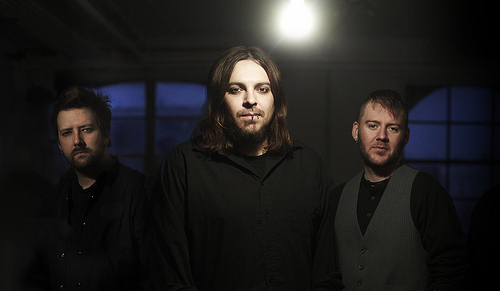Seether rose from the ashes, but won’t soon forget the dark times
Seether is out on tour right now in support of what they’re calling their most brilliant album to date.
Holding On To Strings Better Left To Fray, the band’s fifth studio effort, couldn’t have come about without its forerunner Finding Beauty In Negative Spaces.
Frontman Shaun Morgan is standing in a good place right now, but he traveled down one dark road to get there.
In 2006 Shaun’s highly publicized relationship with Evanescence frontwoman Amy Lee deteriorated and if the nasty breakup alone wasn’t enough, Amy aired Shaun’s demons out like dirty laundry for the entire world to see… and hear.
Amy publicly went on and on about how her hit single “Call Me When You’re Sober” is based on events that resulted in their ruptured relationship and Shaun’s admittance to rehab.
With rehab and Amy finally behind him, Shaun was on the verge of bouncing back from rock bottom, when another dark cloud hung heavily over his head. Shaun’s brother, Eugene, committed suicide while on tour with Seether. The tragedy shook Shaun’s fragile state and resulted in the cancellation of multiple tour dates and a postponed album release.
Amidst devastation and mourning, Shaun was driven to uncover a silver lining. Finding beauty in negative spaces is exactly what the past five years have been about, all leading up the to production of Holding On To Strings Better Left To Fray.
I sat down with Shaun and asked him to look back at the dark times he endured before reaching the light at the end of the tunnel.
Shaun, how does someone find beauty in negative spaces?
You had to have been to dark places to realize that there are good places. I try to see the positive in everything even though it can be difficult. Life throws you curve balls and you have to figure out whether you’re going to let them get you down or manage to come out the other end and be ok.
You came out of rehab ok, what was the road to recovery like?
It was a long process and a lonely one. It was just me and a bad relationship, in a city that I hate with no friends around. It was a miserable and lonely time. It was good in one sense because I’m happy with what came out of it.
People tend to kick you when you’re down. Have you been experiencing a world of cruelty since your release?
Most people have been supportive, other have been dicks. I walked out of a hotel in Toronto once and a guy was sitting in his car waiting outside the hotel and he started playing “Call Me When You’re Sober” really loud. I don’t know what he was trying to prove, but it was just sad because he doesn’t know me.
How do you feel about the side of you the world thinks they know thanks to Amy Lee’s song? Are her lyrics the whole truth?
Being slammed by someone you were in a relationship with is difficult to deal with. Whether or not there was any truth in what Amy had to say, it certainly wasn’t necessary to tell everyone about it. It wasn’t a truth-truth, it was more like an exaggerated, woe is me truth. Now everywhere I go people are different because I’m supposedly this fragile alcoholic. It’s kind of like being watched all the time.
Will you ever get used to having your personal life scrutinized?
It is part of the job and it is something I have to grow accustomed to. It’s centered around me, but there are other guys in this band that they can dig into. Go bug someone else. I won’t ever get used to it. It makes me want to be more reclusive, hide out on the bus and not hang out with people that much. I never know what side they’re on. Team Seether or Team Evanescence?
Can you take us back to the first time you heard “Call Me When You’re Sober”?
When we broke up, the last time Amy spoke to me she said something about some songs on the album being about me and that I mustn’t get offended. When the songs finally came out everyone tried to hide them from me. No one at the label would let me hear them, even my manager. So I thought, “What’s everyone’s problem?” When I did finally hear it, I was disappointed to be reduced to something like that.
Did you feel the urge to retaliate?
I prefer to avoid situations of conflict. There are many things I could have said about her too. But I never did like to tell people that a song is about them. It’s never an attack on them, but more of a process to get it out of my system and now it’s out.
Seether plays the Bell Centre on Saturday, April 21 with Nickelback, Bush and My Darkest Days. More tour dates here. Check out Seether on facebook and twitter. Holding On to Strings Better Left to Fray is available on iTunes now.













